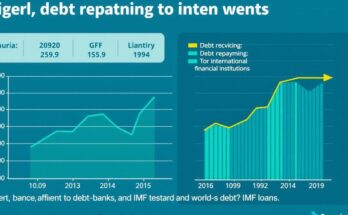Wall Street faced considerable losses as escalated trade tensions, particularly following U.S. tariffs impacting Canada, Mexico, and China, raised worries about a global economic slowdown. The S&P 500 erased all post-election gains, while retailers like Target and Best Buy warned about tariff impacts on profits. The Federal Reserve’s cautious stance regarding interest rates adds to the market uncertainty amidst rising inflation concerns.
On Wall Street, stocks faced another downturn on Tuesday, exacerbated by escalating trade tensions between the United States and its key trade partners. The Trump administration initiated tariffs on imports from Canada and Mexico, alongside a doubling of tariffs on China, provoking retaliatory measures from these countries and raising concerns about a potential global economic slowdown.
The S&P 500 index experienced a decline of 0.1% by the afternoon, erasing all gains made since the Election Day, with approximately 66% of the stocks in this benchmark falling behind. The Dow Jones Industrial Average was down 223 points, or 0.5%, after a more significant drop earlier in the day, while the Nasdaq composite rebounded slightly, gaining 0.9% after nearing 10% decline, typically classified as a correction.
European markets suffered notable losses, particularly Germany’s DAX, which fell 3.5% due to substantial declines among automakers. In comparison, Asian stock markets experienced more moderate decreases. The overall dip in the U.S. stock market has nearly negated all advances since President Trump was elected, driven by concerns about tariffs potentially inflating consumer prices and hindering economic growth.
Retailers, including Target and Best Buy, have proactively warned about the impact of tariffs on their financial performance. Despite reporting better-than-expected earnings, Target’s stock fell 2.4%, citing anticipated pressure on profits due to tariffs and other costs. Best Buy experienced a drastic drop of 12.1%, accompanied by a cautious earnings forecast related to the rising tariff burden.
Best Buy CEO Corie Barry stressed the significance of international trade for their business, noting that China and Mexico are primary sources for their products. She indicated that customers would likely bear the cost of these tariffs due to vendor price adjustments. Tariffs on imports from Canada and Mexico now stand at 25%, with Canadian energy products facing a 10% duty, while the tariffs on Chinese imports have risen to 20%.
In response to U.S. tariffs, China announced additional tariffs of up to 15% on key U.S. agricultural products, while Canada plans tariffs exceeding $100 billion on American goods within 21 days. Mexico is also expected to impose tariffs on U.S. imports. This cycle of retaliatory action amplifies market uncertainties and disturbs business operations across the board.
As quarterly financial reports conclude, companies in the S&P 500 recorded an impressive 18% growth in the fourth quarter. However, the projected growth for the current quarter has been lowered to about 7%, a significant reduction from earlier estimates of over 11%. Overall consumer sentiment has declined, affecting spending patterns that underpin the U.S. economy amid high-interest rates.
Investors are cautiously observing the Federal Reserve’s stance on interest rates. Although there is hope for continued rate reductions in 2025, the Fed has adopted a more tempered approach due to uncertainties tied to tariffs. Interest rates, raised to control inflation, were cut in 2024 as inflation trends approached the desired 2% target, yet the current inflation rate remains slightly above that figure.
In the bond market, Treasury yields exhibited varied movements. The yield on the 10-year Treasury climbed to 4.21%, while the yield on the 2-year Treasury remained stable at 3.94%. Concerns regarding persistently high inflation, exacerbated by tariffs, are contributing to the erosion of bond values. As Sam Stovall, chief investment strategist at CFRA, commented, the ongoing effects of tariffs reinforce fears of heightened inflation impacting the treasury market.
In summary, Wall Street is grappling with sustained losses due to escalating trade tensions involving U.S. tariffs on imports from key partners, resulting in retaliatory actions that threaten global economic stability. The financial outlook for several major retailers, particularly in the S&P 500, has been dampened, reflecting uncertainty regarding profit margins in light of increased costs. The Federal Reserve’s cautious approach amid inflationary concerns further complicates the economic landscape for investors.
Original Source: wsvn.com




